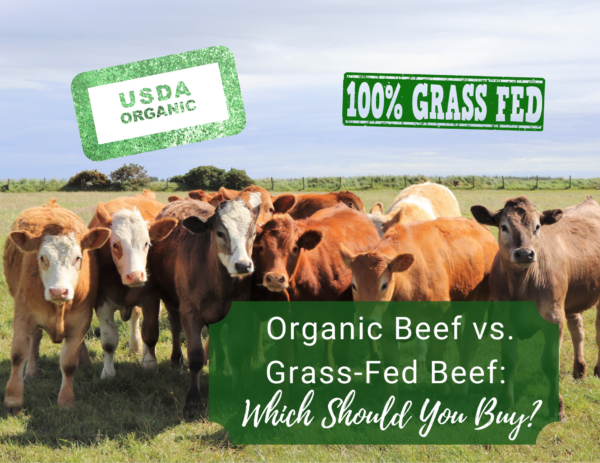
When looking at beef labels, a lot of people mistakenly think that the terms organic and grass-fed are the same. But these meat labels are actually very different – and you need to understand the difference if you want to buy the healthiest beef for your family.
You can read more about what meat labels mean here.
What is Organic Beef?
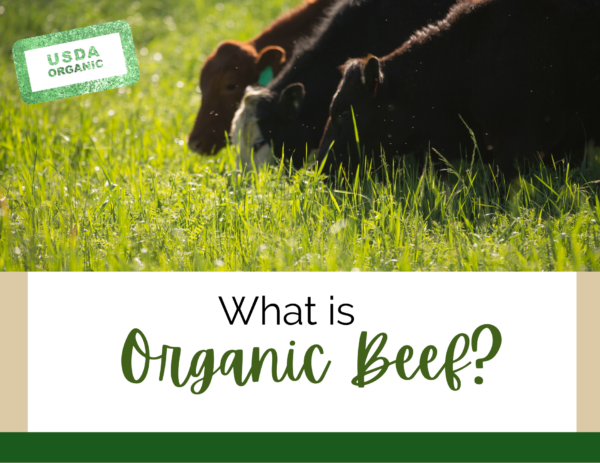
According to the USDA, in order for beef to have the organic label, it must:
- Be fed only organic grass and/or grain
- Not be given any antibiotics or hormones
- Born and raised on organic pasture
- Have unrestricted access to organic pasture
Keep in mind that organic only refers to the process used for raising the animals. Non-organic substances can be added to the meat during processing, such as colorings and spices. But, when buying fresh meat, this isn’t really an issue.
It is debatable as to whether organic products are nutritionally superior to non-organic products. But, as far as our overall health goes, it is definitely better to choose organic – especially when meat is concerned.
The antibiotics, hormones, and other chemicals which are found in conventional meat are associated with numerous health problems, such as autism, early puberty, developmental disorders, numerous types of cancers, and diabetes. Since those hormones can really wreak havoc on our kids, it is especially important to choose organic beef for your children or if you are pregnant.
What is Grass-Fed Beef?
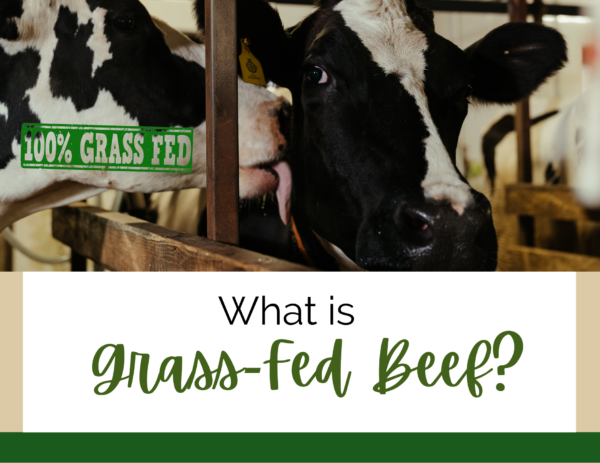
For beef to carry the grass-fed label, it must have been fed only mother’s milk and grass or other forage for its entire life. This generally means that the cows were put out to pasture. However, this isn’t always the case. A cow can be grass-fed, but have spent a significant amount of its life caged indoors so long as the farmer was giving it hay instead of grain to eat. By contrast, the label pastured or pasture-raised means the cow was raised outdoors on a pasture. This term is still unregulated by the USDA though, so it is hard to completely trust it.
You probably won’t find grass-fed beef which was 100% pasture-raised. This is simply because the weather conditions don’t allow it in most areas. How, for example, are cows supposed to eat grass in the winter when the grass is covered by snow? Thus, the cows will be indoors eating hay from feed bins. You can read more about the difference between grass-fed and pasture-raised here.
There are numerous health benefits of choosing grass-fed beef over conventional beef. Chris Kresser does a pretty good job of laying out the benefits in this article. Some of the benefits of grass-fed beef over grain-fed beef include:
- More Omega 3 and less Omega 6
- Fewer calories and typically leaner (less fat)
- More CLA (Conjugated linoleic acid)
- More vitamins, minerals and antioxidants
But choosing grass-fed does NOT mean you are getting “healthy” meat. Grass-fed beef can still contain growth hormones, steroids, antibiotics, and other chemicals. The grass the cows are eating can be treated with pesticides and herbicides.
If You Can’t Have Both, Then Choose Organic
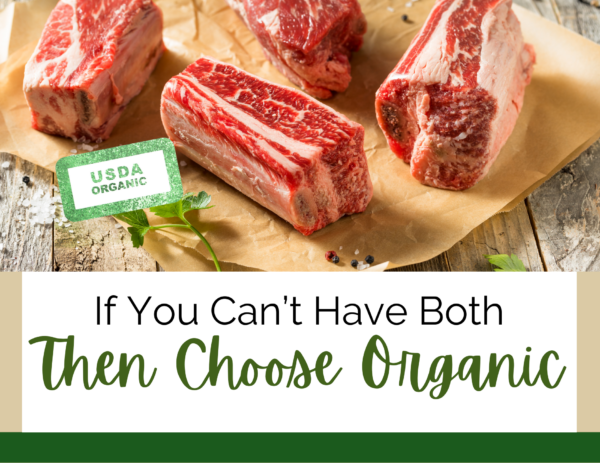
Ideally, you would always buy beef which has both the Organic and Grass-Fed labels. But, if you have to choose between the two, go for organic. Here is my reasoning:
Most organic beef is probably eating a mostly grass-fed diet. This is because it is really difficult to raise organic beef on a grain diet. When cows eat grains, it weakens their immune systems and causes numerous health issues, which means they’d have to be given antibiotics (and they wouldn’t be organic anymore). So the organic cows are mostly eating grass in the pasture, and being supplemented with grains and probably also “finished” (i.e. fattened up) with grains during the last month or two of their lives. Unfortunately, even after just a few days of eating grains, the composition of meat will change and it becomes less nutritious. This chart from American Grass Fed Beef shows how Omega 3 composition declines in the finishing feedlot:
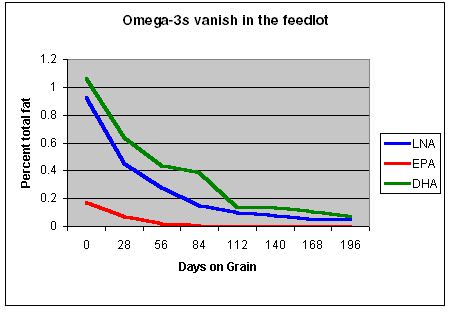
While grass-fed beef might be nutritionally superior to organic beef which is fed grain, the risks associated with hormones, antibiotics, GMOs, and other chemicals are just too high. I’d rather sacrifice a bit of Omega 3 and vitamins to ensure my kids aren’t getting a dose of rBGH!
If you can, buy both organic grass-fed beef. If you have to make the choice between the two, then opt for organic beef.
Where to Buy Beef
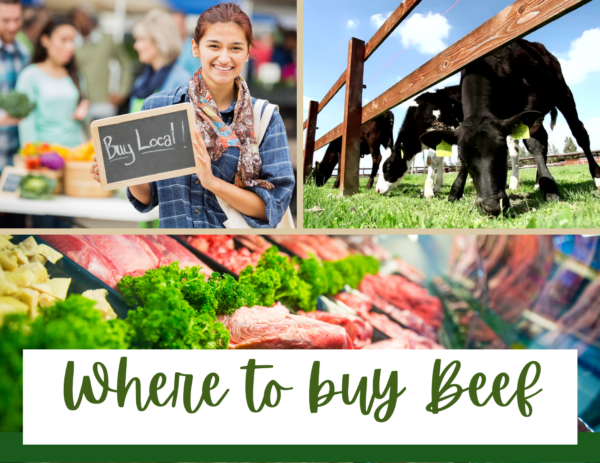
When I was living in Hollywood (we’ve recently moved), we bought our meat from a local farmer. It is cheaper, you support small farmers, and you know where your meat is coming from. Check and see if you have any organic farmers around you raising pastured, grass-fed beef. If they are far away, then you can do what we did: buy an extra freezer. Then you can just buy a whole cow (literally) and put portions into the freezer.
You can now usually find organic, grass-fed beef in health food stores and supermarkets like Whole Foods. For better deals and quick delivery, you shop their online store. I recommend these organic grass-fed beef brands:
Do you eat grass-fed beef? Have you made the switch recently and notice a difference? Let me know below!
Sources for this article:
http://www.organicconsumers.org/organlink.cfm
http://foodrevolution.org/blog/the-truth-about-grassfed-beef/
http://www.wholefoodsmarket.com/blog/organic-meat-what-does-organic-really-mean
http://www.npr.org/2010/04/08/125722082/the-truth-about-grass-fed-beef
http://www.sfgate.com/bayarea/article/Grass-fed-vs-grain-fed-Beef-up-on-the-facts-5255962.php
Latest posts by Sylvie McCracken (see all)
- Treating H. Pylori (Part 3): What H. Pylori Does to the Body - August 8, 2022
- Treating H. Pylori (Part 2): How H. Pylori is Contracted - August 3, 2022
- Understanding Beef Labels: Organic, Pastured, Grass-Fed & Grain-Finished - July 25, 2022